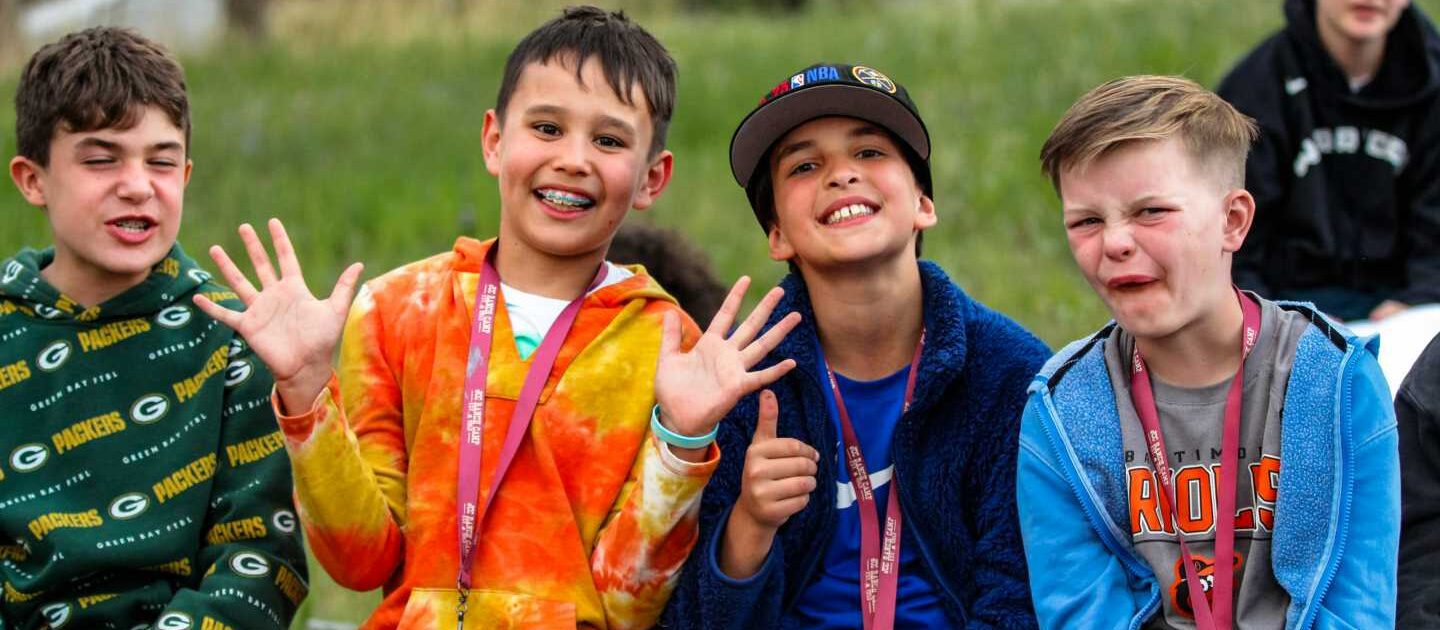Miss an email? No worries, we got you covered! You can view all our Ranch Camp 101 emails below.
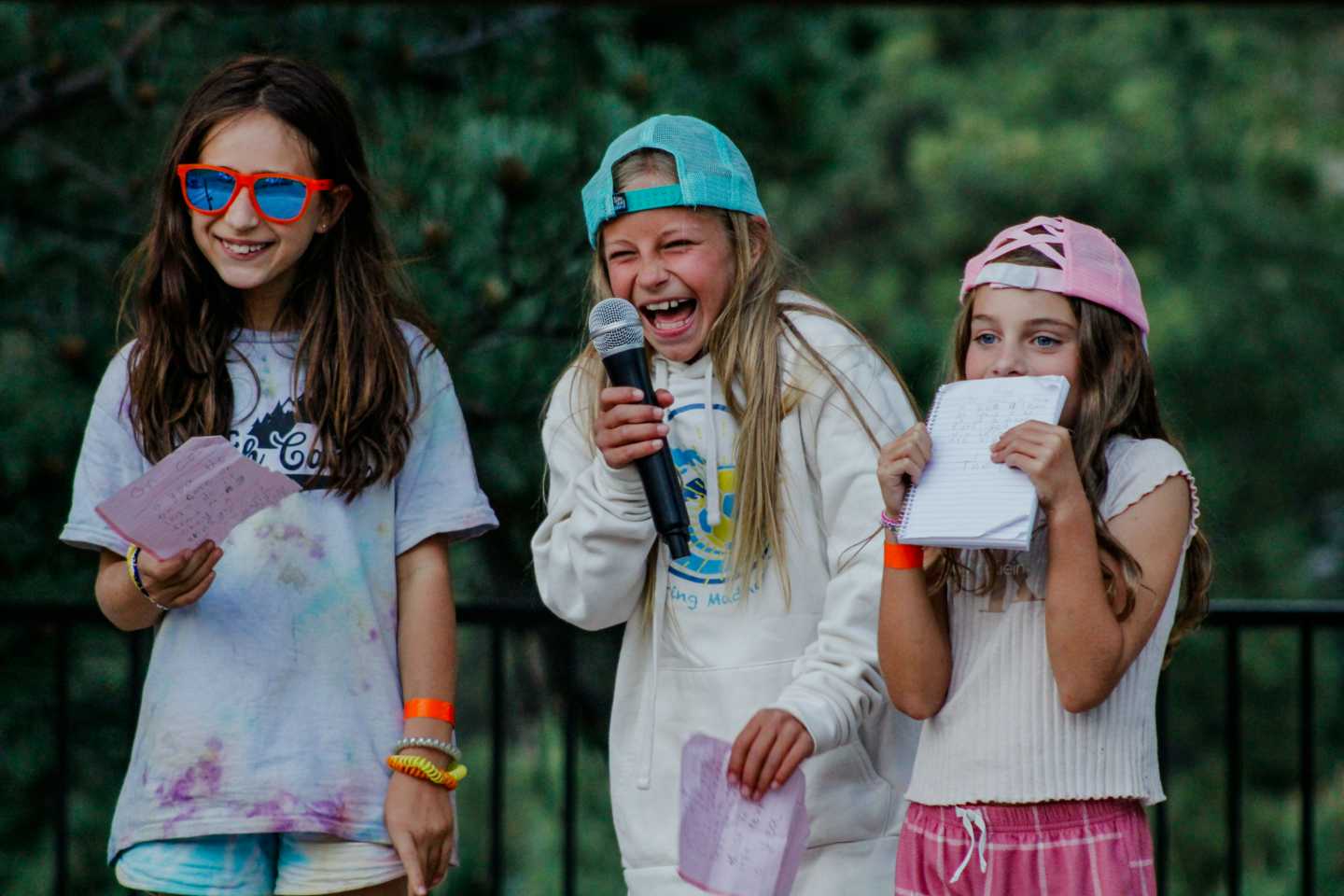
Staying Healthy at Camp
Keeping campers healthy and safe – physically, mentally, and spiritually – is our number one priority. When it comes to health and safety, Ranch Camp has a reputation for excellence, and this summer is no different. Below, you’ll find an overview of our approach to helping campers stay healthy at camp. You can find more information in our Summer Handbook. This section will take about 5 to 10 minutes to read and review.
If you are concerned about how we might accommodate your camper’s health-related needs, whether it be physical or mental health, or if they are struggling with basic health and hygiene routines prior to camp, please reach out and let us know so we can best prepare and set them up for success this summer. The more we know about your campers prior to their arrival, the better we will be at keeping them healthy- and healthy campers have more fun!
Our Staff Teams
When it comes to staying healthy, both physically and mentally, we have two incredible staff teams to support campers.
For physical health, we have a long-standing partnership with excellent medical professionals in the area that help evaluate and shape our summer policies annually. Our on-site medical staff includes experienced nurses, paramedics, and EMTs who are passionate about working with youth and providing the best medical care possible. We devote significant time to health and safety during our staff orientation so that every staff member knows exactly what to do in an emergency.
- Medical needs at camp: Ranch Camp has an onsite clinic ( Mirpa’ah) that is staffed by a medical staff consisting of a Registered Nurse and clinic assistant (an EMT, paramedic, CNA, or other certified professional with a doctor available by phone always. If your camper needs physical health support at camp, you should encourage them to talk to their counselors about visiting the clinic. Counselors will visit the clinic with their campers for a variety of reasons including but not limited to persistent headaches, stomach aches, twisted ankle, bumps, scrapes, and bruises, heat exhaustion or dehydration, suspected fevers and other symptoms of illness. Campers who take medication will also visit the Clinic or Clinic Team for medication administration.
- Please see our Handbook PAGE __ for details on our Physical Health and Wellness Policies, including Doctor or specialist visits, spending the night in the Clinic, emergency EMS calls, Non-emergency dental or orthodontic issues, eggs, nits, or lice, contagious conditions, prolonged illness, etc.
- Additionally, all staff members are both CPR and first aid certified.
For mental health, we bring a seasonal Camper Care Team together, who support campers daily in maintaining their mental, emotional, social, and spiritual health. The members of the Camper Care Team have relevant experience, which may include backgrounds as teachers, special education, social workers, school counselors, psychologists, and other mental health professionals. We also have two full-time staff at camp, Assistant Director of Camper Care and Inclusion Specialist, whose jobs are to make sure campers’ health, safety, and wellbeing needs are being met at camp, physically, emotionally, and spiritually.
Please see our Handbook PAGE __ for our Mental and Behavioral Health and Wellness policies, such as Inclusion and Support at Camp, Pre-Camp Intake Calls, Behavioral Interventions at Camp, Behavior expectations, JCC Camper Conduct Agreement, JCC Family Conduct Agreement, Early Dismissal, etc.
Physical Health
We do everything we can to ensure the health of our campers, but health and wellness at camp is truly a partnership with our families and caregivers. Here are a few things you can do to make sure your camper stays healthy while at camp:
- Make sure your child comes with two full-sized water bottles (16oz+), sun protection like a brimmed hat and sunglasses, and a daypack to carry these items in. Hydration and sun protection are the most crucial factors in keeping campers healthy.
- Send your camper with extra sunscreen and practice applying sunscreen prior to camp! While you may think your camper has enough sunscreen to cover themselves for a decade of sunny days, these things are often lost, misplaced, or spilled, so pack extra. Sunscreen will also travel in your camper’s daypack. Bunkmates are not permitted to share sunscreen, bug spray, and other similar products.
- Send your camper with their own LABELED supplies for basic health and hygiene needs (including shampoo, conditioner, toothpaste, toothbrush, deodorant, body wash, hairbrush, etc. – whatever they regularly use at home should come to camp). If your camper runs out of or loses any basic health and hygiene items, please instruct them to tell a staff member right away to get a replacement – we keep most health and hygiene items on hand. We will be in touch if they need an item that we do not already have on hand.
- Help your camper build consistent health and hygiene routines. Build independence in their routines for brushing teeth, getting dressed and undressed, showering, using the bathroom, caring for their hair, etc. Campers should be able to do their health and hygiene routines with developmentally appropriate levels of support.
Mental and Emotional Wellness
Review the Camper Conduct Agreement with your camper and help them understand camp’s behavior expectations. Talking through the behavior expectations beforehand will prepare your campers to work through any social or emotional conflict they may experience at camp. Encourage your camper to talk to a staff member if issues arise and let them know that staff are trained to help them overcome social and emotional conflicts.
Medications
If your child regularly takes medications – prescription medication, over the counter medications, vitamins/supplements, homeopathic medications, essential oils, and anything else that can be inhaled, absorbed, or ingested:
- All medications must be turned in to the health clinic staff on the first day of camp.
- All medications must be in original packaging and cannot be expired (do not “pre-package” yourself OR put medications in mixed bottles or Ziploc bags!)
- The dosage, medication name, and administration instructions on the medication you bring to camp MUST EXACTLY match the dosage and medication name listed on your Physician Form and Health History Form.
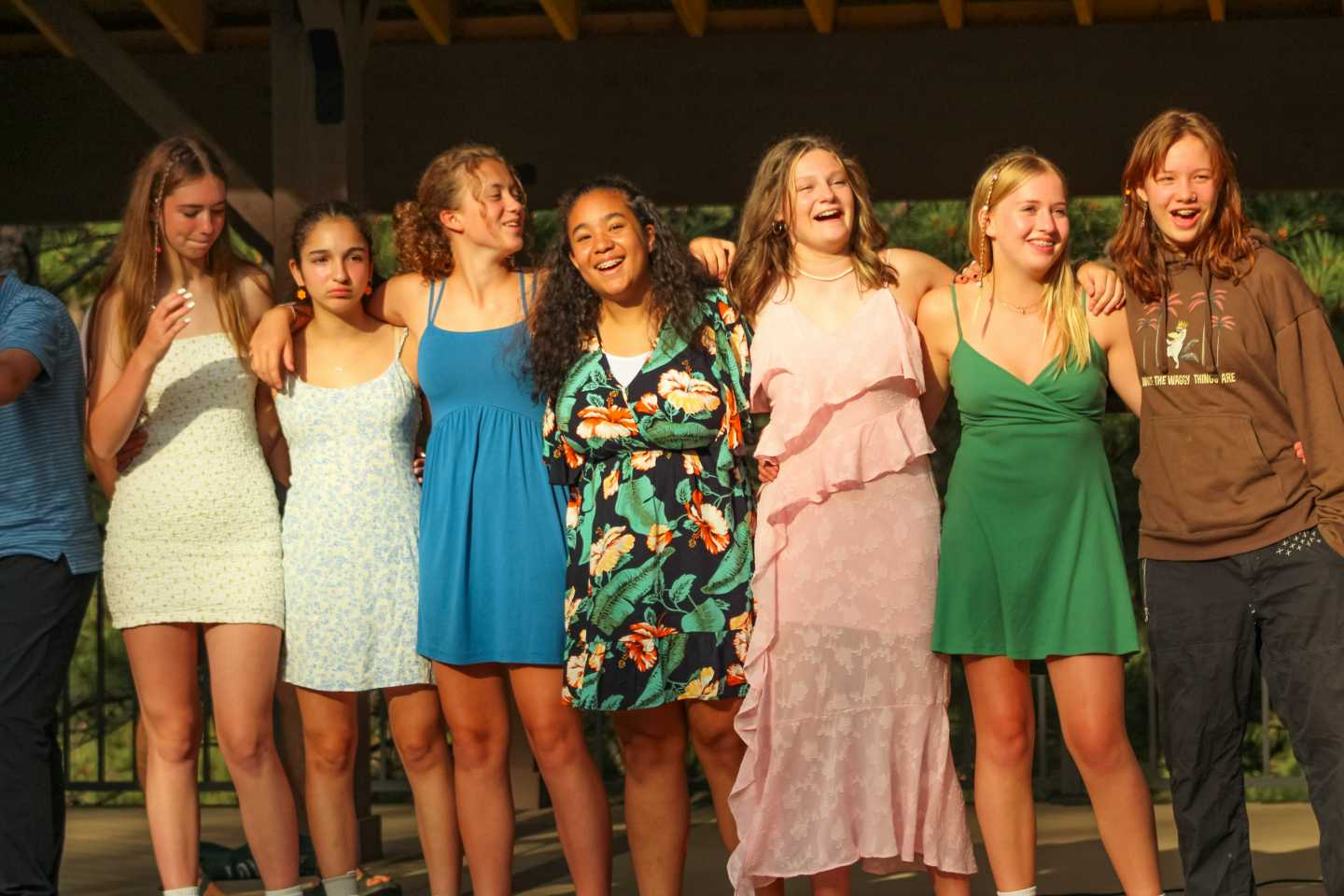
Missing Home
Our staff are experts in helping campers who miss home re-engage in camp activities and truly have the best summer ever. By sending your camper to camp, we are beginning a partnership. We will work together to help them grow, experience all the wonderful aspects of camp, meet new friends, have a blast, and learn the kinds of skills that will prove invaluable as they mature.
Why do we say missing home instead of homesick?
Missing home is a feeling that is completely normal and an expected part of coming to camp but it is not a physical or mental illness. We want campers to know that nothing is wrong with their bodies or brains if they miss home which is why we refrain from using the word “homesick.” It seems small, but this language change helps campers feel more comfortable and confident during their time at camp. Missing home is one of the many opportunities that campers will have to exercise their ‘struggle muscles’ and learn that it’s okay to feel all their emotions at camp. They can miss home and still be excited about horseback riding. They can miss home and still feel the happiness of making a new friend. They can miss home and still long for babka on Shabbat. They can miss home and still love the people at home who are waiting to hear all about their summer adventures.
The Do's
- Use language like ‘I know you will have a fun, terrific time at camp,’ ‘you are so brave for going to camp and you’re going to have fun every single day,’ and ‘We are so proud of you for going to camp on your own’ rather than ‘We will miss you’ and ‘we can’t wait for you to come home.’
- Let your camper know that if they do miss home, it is totally normal and okay! Give them some strategies for when they miss home like writing a letter, playing a game with a friend, talking to a staff member, or doing something physical like dancing or shaking it out.
- Practice independence with your camper! Give them the space to be responsible for themselves in their at-home routines.
- Talk to your camper about what their cabin will look like, what sleeping in a bunk bed is like, what eating buffet-style in a dining hall is like, and what using a shared bath house is like. Need help with this? We have a guide to help with these conversations!
- Send a letter ahead of time so there’s something from you waiting for your camper on the first day of mail. Continue to send your camper letters and camp stamp emails throughout the session.
- Pack personal items from home like a favorite stuffed animal or a family picture.
- Help your camper understand that they can trust and confide in their staff members to help them with any needs. It is crucial for them to know that they have people at camp with their best interests at heart.
The Don'ts
- Do not bribe your camper to enjoy camp; instead talk to them about finding confidence, independence, and best friends while at camp.
- Do not tell your camper that they can come home if they are having a difficult time. This gives campers an incentive to make a difficult time for themselves and leave camp early.
- Do not use the word homesick; instead, say missing home.
"Homesick" Letters
If you receive a “homesick letter,” do not panic! Remember two things:
- It passes. By the time you receive a letter describing a tough time, your camper probably isn’t missing home anymore. In the time it takes for their letters to reach you, we’ve been building friendships, jumping into activities, and ensuring campers feel included, seen, and safe.
- If you receive something that concerns you in a letter, please don’t hesitate to reach out. Campers, especially in their first years at camp, are more apt to share with their parents and caregivers than go to their counselors about some things. Let us know what’s going on so we can support your camper as best as possible.
Now, as far as you missing your camper goes, meet a friend for coffee, see some movies, go on an adventure, write lots of letters, and relax. We frequently post photos during the summer, so you can see your camper just about every day! And remember to greet your returning camper with lots of love and smiles – hearing about all the adventures they had at camp will be the best part of your summer.
Feel free to call and check in with us anytime. Katelyn, Max, Rachel, and Tuyet, and our incredible Camper Care Team are available by email and phone during the summer to answer any questions or concerns you may have.
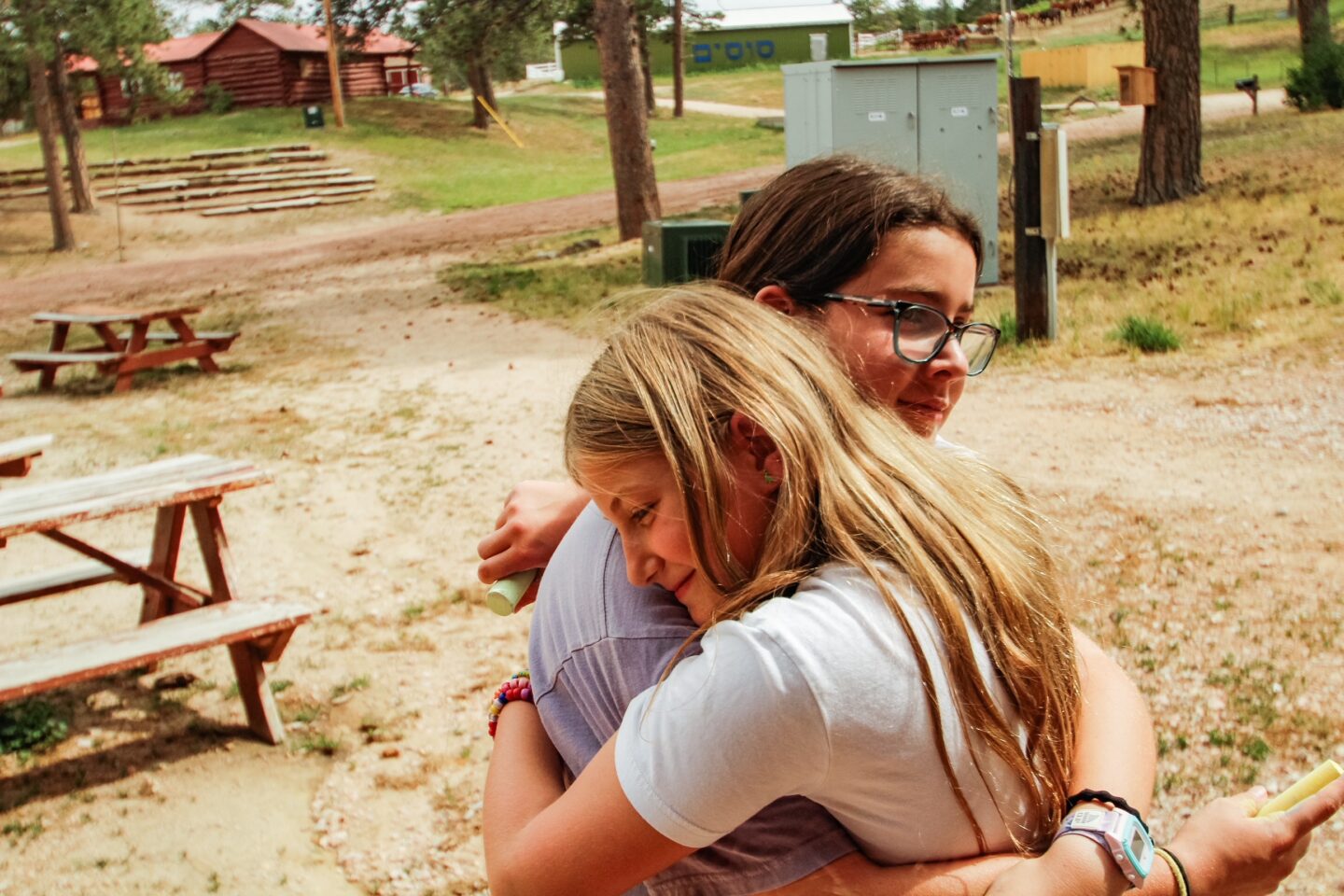
Making Friends
Making new friends and reconnecting with old friends is a true highlight of every camper’s experience at camp. At Ranch Camp, we strongly believe that everyone has the right to be seen, heard, and felt. With this focus, campers will be able to have those magic moments that make summers at camp so special. Active and open lines of communication between parents, caregivers, campers, and our team are part of the reason campers keep coming back to Ranch Camp for the best summer ever. This section will take about 5 minutes to read and review.
We know that campers often feel more comfortable if they know they already have a friend in their cabin that they’ve met before camp. Introducing campers to each other and scheduling time for them to connect before camp can be hugely valuable. To help make these connections, we’ve attached a Unit Directory to this email. This directory has names and contact information for all the campers in the Chalutzim/Metapsim/Toshavim/Tiyulim Unit this summer. While you won’t know your camper’s bunk assignment for another couple of weeks, campers in the same unit will spend a lot of time together throughout the session, so please feel free to connect!
At camp, we spend A LOT of time during the first days, and the entire session, facilitating ice breakers, playing intentional team-building games, and helping campers get to know each other. Our staff are experts in understanding the social dynamics of each cabin and coaching campers in friendship building. Each day, campers will connect with their cabin mates, but also join activity groups that help expand their social experience.
Navigating Friendships
One of the biggest opportunities for growth at camp is learning how to navigate friendships. From living together to eating together to doing activities together, campers experience a huge level of social interaction each day. With this level of social interaction, it isn’t uncommon for tension and social conflict to occur which is why we train our staff extensively to help campers exercise their “struggle muscles” in building and maintaining friendships. We have several strategies and techniques rooted in non-violent communication and restorative justice practices that we use at camp. We ask for your partnership in preparing your camper for the social aspects of camp.
Share the definition of bullying we use at camp with your camper: Any behavior directed towards a camper that causes that camper to feel excluded, unseen, or unsafe. Talk to them about the community they are entering or returning to: We take care of each other and treat each other with kindness and respect. Our camp community uplifts each other. For this to remain true, we must have the commitment of all members of our community to never tolerate anything less. Every bunk creates a ‘brit’ or, in English, a contract, at the start of their session to set ground rules. We establish behavior and social expectations and lay the groundwork for future conversations on the subject, should the need arise.
Conflict Resolution
More information coming soon!
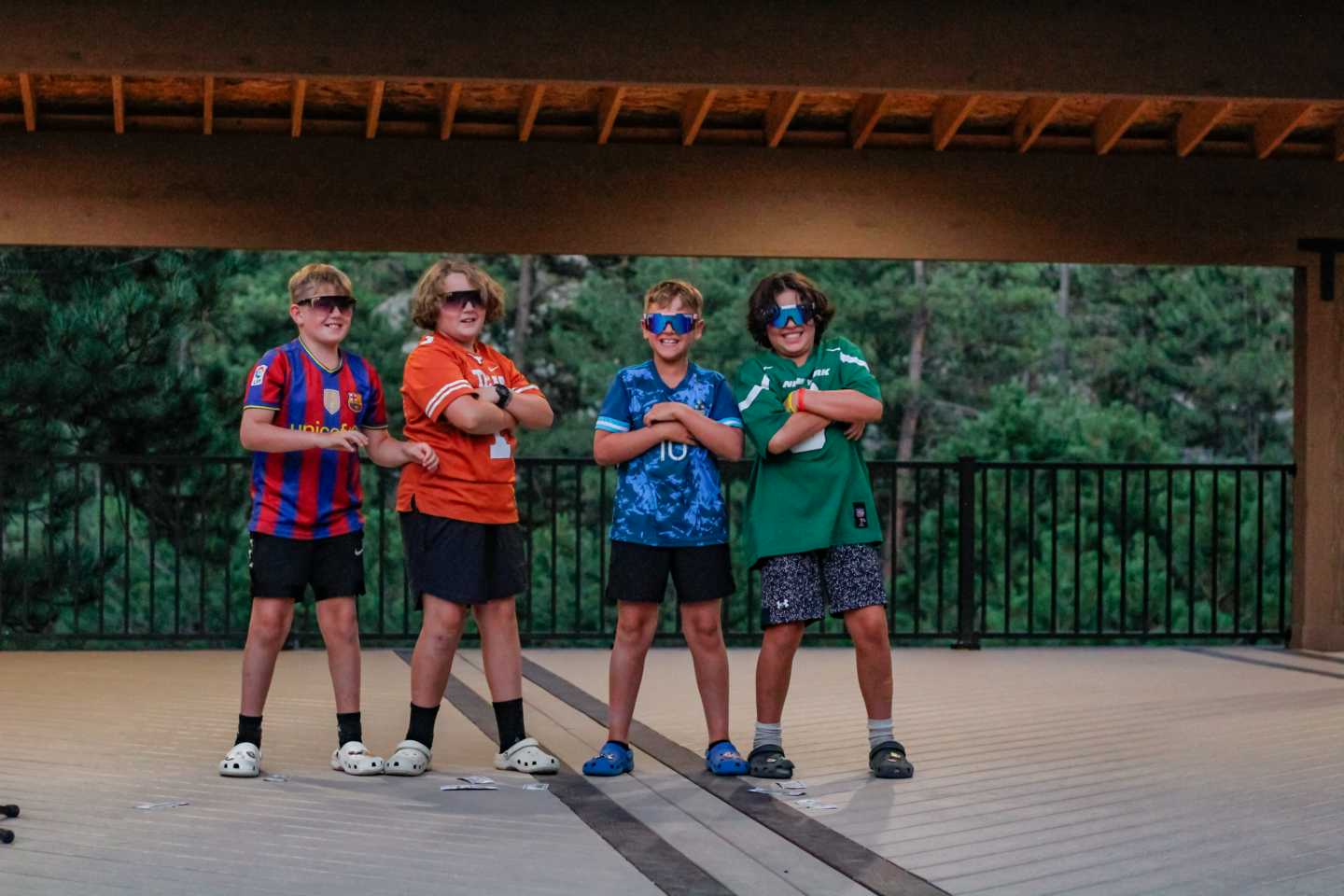
Packing
Clothing, camp is a casual place. Your camper should feel comfortable in all the clothes and gear that they bring to camp. Camp is also full of adventures that often lead to campers getting dirty. It’s important to send clothing, shoes, gear, bedding, ect. that your camper won’t mind getting dirty or potentially losing.
Please send your child with clothing that is suitable for physically active programming. This includes well-fitting closed-toe shoes, shirts, pants, and shorts that they can move in, and swimwear that stays in place. Shoes should be well-fitting and have a backing around the heel for general activities.
Clothing that advertises alcohol, sex, drugs, or cigarettes is unsuitable dress for our camp community.
Packing Lists
Luggage
The best luggage is a large, top-open duffel bag or trunk. Most items will be unpacked onto shelf space in the cabin. Extra items can be kept in their bags and stored under their bed. Please make sure your camper helps pack for camp so they feel comfortable knowing what they have and where everything is located. Don’t be concerned about buying a new trunk or fancy duffle bag for camp. The suitcases and/or duffel bags that you may already have are just fine. Campers unpack into shelves and luggage is stored under beds or outside of the bunk. If you do send a trunk, please try to make sure it has wheels!
Traveling via Airport: When it comes to getting luggage to and from camp, some families choose to send some or all of their luggage via delivery services such as UPS. This can, sometimes, cost less than checking a bag. If you choose to do this, let us know to expect the bag and we will make sure it is ready for your camper when they arrive. If you would like a camper’s luggage shipped from camp, you can arrange for pickup with UPS and have a label sent to us which we will affix to the bag.
Electronics
Leave electronic devices and anything with a screen at home. Ranch Camp prides itself on being a completely screen-free environment. If your camper needs access to an electronic device at camp, please contact us. If your camper brings an electronic device to camp, it will be kept in the office until their camp session ends.
Traveling via Airport: Devices and cell phones are okay for travel to and from camp, but we will hang on to them until it’s time to travel home. We’ll make sure all devices are charged and ready for departure day.
Labels
Label EVERYTHING with your camper’s full name – even if you don’t think it needs a label – like toothpaste – it needs a label. Labeling with initials is not sufficient. Any unlabeled items found at the end of the session will be donated. Label, label, label with your camper’s FULL NAME.
We do our very best to ensure that your camper returns home with all the items they came to camp with but lost and found is inevitable. All lost and found items that ARE LABELED with a camper’s first and last name will be available for pick up at the JCC in Denver in August after the camp season closes. All lost and found items that ARE NOT LABELED with a camper’s first and last name will be donated to a local thrift store or charity after the camp season closes. If you would like more information, please see our Summer Handbook on page 27.
Crucial Items
Remember: please send LOTS of sunscreen, pre-addressed stationery, stamps, toothpaste, and other toiletries.
A HAT and WATER BOTTLE are musts! Sending extra hats and water bottles in case they are misplaced gets bonus points because all campers must have both all day, every day at camp.
These items are CRITICAL for your child to have a safe and enjoyable summer:
- At least two full-sized water bottles
- Sunscreen (MUST be labeled with first and last names)
- Closed-toe shoes and clothes for active programming
What Not to Bring
A Few Items NOT to Bring:
Some items can cause environmental or behavioral problems at camp and are not allowed due to licensing. Please read this list carefully and ensure that NONE of these items make it into your camper’s luggage. We need your partnership with packing to make certain that the camp has a fun, safe, and clean environment.
- Food! (please reach out to our team if you have a camper who would benefit from bringing their ‘comfort’ foods to camp)
- Money (other than for plane travel)
- Cell phones, electronic games, e-readers, and iPods (other than for air travel or bar/bat mitzvah studies)
- Silly string, stink bombs, and other gag gifts/toys that are disruptive to group living
- Weapons of any shape or size, including knives
- Roller blades and/or skateboards
- Clothing that advertises alcohol, sex, drugs, violence, or cigarettes
- Digital Cameras are allowed, though not recommended and Ranch Camp is not responsible for any loss or damage.
Lost and Found
Lost and Found
Although we do our very best to ensure that your camper returns home with all the items they came to camp with, lost and found is inevitable. We will do our best to reunite you with any lost items in line with our lost and found guidelines:
We will have a lost and found table on departure day. Please make sure to take a look through before you leave with your camper.
All lost and found items that ARE LABELED with a camper’s first and last name will be available for pick up at the JCC in Denver in August after the camp season closes.
- We will provide a photo album of all of the labeled lost and found items. This will be available on CampInTouch in August after all sessions are through.
- Unfortunately, it is not likely that we can help you reunite with your lost item during the summer.
- If you have lost a high value item, please reach out to us. Chances are, we have it and have noted it.
If you are an out-of-state family with labeled lost and found, please let us know, and we can mail your lost items to you. We will charge your CampInTouch account for any required postage.
All lost and found items that ARE NOT LABELED with a camper’s first and last name will be donated to a local thrift store or charity after the camp season closes.
We CANNOT search for lost items that are not labeled with a camper’s first and last name. Ranch Camp is not responsible for lost or damaged personal property
